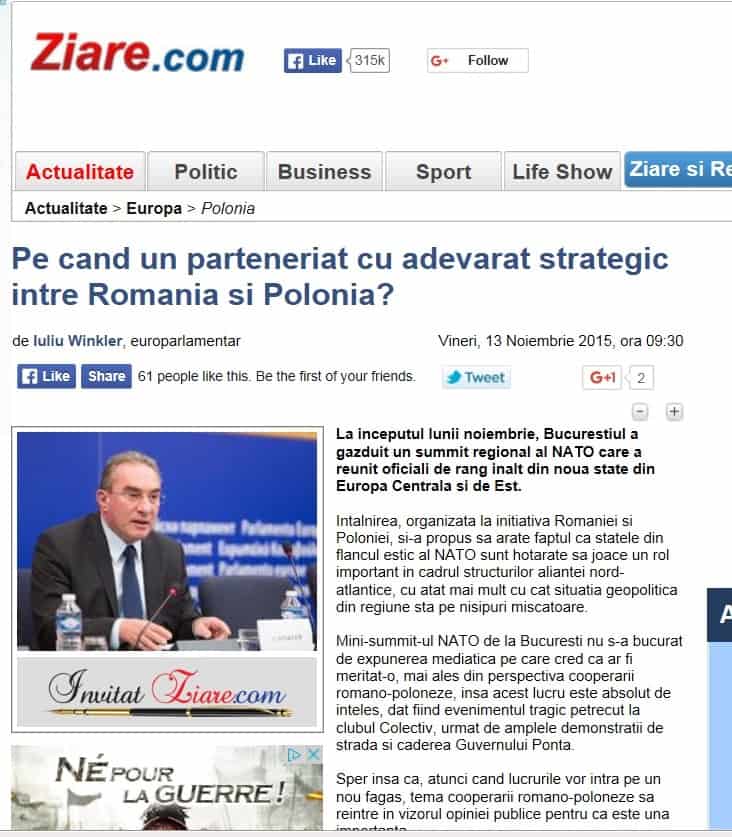At the beginning of November, Bucharest hosted a NATO regional summit, bringing together high-level officials from 9 Central and East European countries. The meeting, which came at the initiative of Romania and Poland, aimed to portray the decisive readiness of states from NATO´s Eastern Flank to play an important role in the Alliance´s structures, in the context of continued Russian aggression in Ukraine.
The NATO mini-summit in Bucharest has not enjoyed the sort of media exposure I believe it would have deserved, especially from the perspective of Romanian-Polish cooperation; however this is completely understandable given the tragic occurrence from Club ´Colectiv´, followed by the ample street demonstrations and the fall of the Ponta Government. I however hope that when matters return to normality, the topic of Romanian-Polish cooperation will resurface in the public’s attention, as this represents an important issue.
Bringing into discussion the Partnership between Romania and Poland, I believe that, given its current nature, the relationship does not deserve such a label, ´Strategic´; indeed, in the last years, we have not witnessed any real progress within this partnership. The visit of the Romanian President to Warsaw, this spring, has not changed the state of affairs. This, rather, could be considered a formality, an occasion to emphasize those matters on which there is considerable potential for Romanian-Polish cooperation. We are certainly right to talk about friendship and historical tradition; these are arguments as convincing as the common geostrategic interests or the joint destiny of the two nations which suffered together half a century, on the wrong side of the Iron Curtain. There is however a need for more than this sort of general declarations.
I believe that the partnership between the two countries is indeed one of a strategic importance. Today, to a larger extent than in previous years, one has strong arguments which should urge the leaders of the two states to create a truly functioning partnership. The first argument is the so called Eastern Flank of NATO. The geopolitical situation in the region, fluid beyond being dangerous, imposes NATO cooperation, to its highest degree of efficiency possible. Nonetheless, for now, NATO´s Eastern Flank is merely a list of states. Their cooperation has to be constructive, it has to contain substance, all this with a touch of high urgency, should we wish to maintain NATO´s active attention.
Another argument is the Eastern Neighbourhood of the Union, where both Poland and Romania have outstanding interests in the Ukrainian situation, the European trajectory of the Republic of Moldova and the EU´s relations with the Russian Federation, a continuously dividing factor for the EU. The solutions for Ukraine and the support for Moldova´s European path depend on the rhythm of the various reform processes that unfold in the two countries. Together, Poland and Romania can succeed in keeping such subjects, related to the Eastern Neighbourhood and the European support for states caught up in Russia´s web of interests, on the EU´s daily agenda.
The third argument is an economic one, a much more composite and nuanced factor, compared to the former two. Romania and Poland, but also other states from the Eastern Flank, have strong common arguments in matters of security, in NATO as well as in the EU. Yet, as concerns the economic priorities, the national interests of the various Member States are much more divergent. The common economic interests of Romania and Poland are not easy to promote in the European Energy dossier, as long as these are contrary to some energy projects supported by Germany. Furthermore, it remains difficult to intensify the bilateral economic and commercial relations of the two partners, as vital road and rail infrastructure, meant to interconnect the eastern periphery of the EU, is lacking, and the absence of enthusiasm with which Brussels chooses to see projects in this field remains evident. Nonetheless, with all these hindrances, the economic cooperation has to be intensified. Given that Poland´s economic priorities are very similar to those of Romania, our country would benefit significantly from an extended cooperation with Warsaw. A single example, Poland´s performance in using structural funds could represent a model worth applying in Romania, a country that witnessed the sad performance of scoring last in terms of usage of its European Funds in the 2007-2013 budgetary period.
Here are thus some strong arguments that could persuade decision makers in Romania to shift from words to actions, as regards the Strategic Partnership with Poland.
There is nevertheless a noteworthy challenge here, difficult to expose as long as it remains on the list of taboo subjects in today´s Romania. This obstacle is called ´Mitteleuropa´. Central Europe, an area to which Romania also partially belongs, is defined generally by everything that surrounds the two giants, Germany and Poland. However, if we proceed to delineate the concept of Central and Eastern Europe, we then find the two potential strategic partners, Romania and Poland. Romania´s road towards the concretization of the Partnership with Poland is yet passing through some Central European states, the first being our neighbour, Hungary. The normalization of the Romanian-Hungarian relationship, which finds itself in a low-key state, perhaps its most restrained stance in the last 15 years, is the first step towards Romania´s successful assumption of a new role in NATO´s Eastern Flank and in Central and Eastern Europe.
ziare.com/ http://www.ziare.com/europa/polonia/pe-cand-un-parteneriat-cu-adevarat-strategic-intre-romania-si-polonia-1393117








